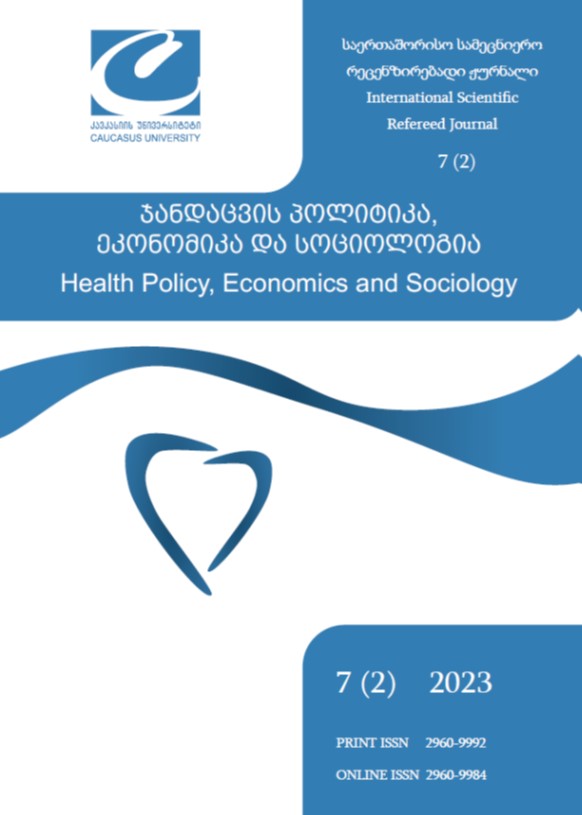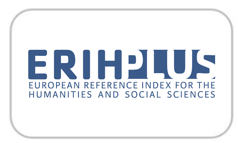მულტიდისციპლინური მიდგომის მნიშვნელობა პალიატიურ მზრუნველობაში მსოფლიო პრაქტიკა და საქართველოს რეალობა
DOI:
https://doi.org/10.52340/healthecosoc.2023.07.02.13საკვანძო სიტყვები:
ჰოსპისური ზრუნვა, მულტიდისციპლინური მიდგომა, პალიატიური ზრუნვაანოტაცია
კვლევის მიზანია მულტიდისციპლინური მიდგომის მნიშვნელობის დადგენა პალიატიურ მზრუნველობაში და საქართველოში ამ მხრივ არსებული გამოწვევების შესწავლა. კვლევამ აჩვენა გეოგრაფიული დისბალანსი პალიატიური ზრუნვის სფეროში, კერძოდ, ამბულატორიული პალიატიური მზრუნველობის სახელმწიფო პროგრამა ქვეყნის 76 მუნიციპალიტეტიდან დაშვებულია მხოლოდ თბილისში და 6 მუნიციპალიტეტში. მუტიდისციპლინური პალიატური მზრუნველობის პრაქტიკაში განსახორციელებლად და პაციენტებისა და მათი ოჯახის წევრების ცხოვრების ხარისხის გასაუმჯობესებლად, აუცილებელია: ამბულატორიული პალიატიური ზრუნვის ხელმისაწვდომობისა და დაფინანსების გაზრდა, პალიატიური ზრუნვის თანაბარი გეოგრაფიული გადანაწილება მთელს საქართველოში, პირველადი ჯანდაცვის რგოლის გადამზადება პალიატიურ მედიცინაში, პალიატიური ზრუნვის საწოლფონდის გაზრდა და მულტიდისციპლინური გუნდების შექმნა, პალიატიური ზრუნვის ინტეგრაცია ჯანდაცვის სისტემებში.
წყაროები
კორძაია დ. (2005) პალიატიური მზრუნველობა; გამომცემლობა პოლიგრაფი; ფონდი ღია საზოგადოება საქართველო.
გოგოხია რ, ძოწენიძე ფ, კიკნაძე ნ, მირზიკაშვილი ნ. (2021). პალიატიური მზრუნველობის არსებული სერვისები საქართველოში. ფონდი ღია საზოგადოება საქართველო. https://osgf.ge/paliatiuri-mzrunvelobis-arsebuli-servisebi-saqartveloshi/
აბესაძე ი, ვახანია უ, კურატაშვილი მ, ოთიაშვილი დ, ძოწენიძე ფ, წულაძე თ, ხუბუა დ, ჯავაშვილი გ. (2021) ინტეგრირებული ზრუნვა; საქართველოს ზრუნვის პლატფორმა
, საქართველოს კანონი. (n.d.). საქართველოს კანონი - matsne.gov.ge. https://matsne.gov.ge/ka/document/download/4471234/0/ge/pdf
Azevedo, C., Pessalacia, J. D., Mata, L. R., Zoboli, E. L., & Pereira, M. da. (2017). Interface between social support, quality of life and depression in users eligible for palliative care. Revista Da Escola de Enfermagem Da USP, 51(0). https://doi.org/10.1590/s1980-220x2016038003245
Bajwah, S., Oluyase, A. O., Yi, D., Gao, W., Evans, C. J., Grande, G., Todd, C., Costantini, M., Murtagh, F. E., & Higginson, I. J. (2020). The effectiveness and cost-effectiveness of hospital-based specialist palliative care for adults with advanced illness and their caregivers. Cochrane Database of Systematic Reviews, 2020(9). https://doi.org/10.1002/14651858.cd012780.pub2
Barros de Luca, G., Zopunyan, V., Burke-Shyne, N., Papikyan, A., & Amiryan, D. (2017b). Palliative care and human rights in patient care: An armenia case study. Public Health Reviews, 38(1). https://doi.org/10.1186/s40985-017-0062-7
Buss, M. K., Rock, L. K., & McCarthy, E. P. (2017). Understanding palliative care and hospice. Mayo Clinic Proceedings, 92(2), 280–286. https://doi.org/10.1016/j.mayocp.2016.11.007
Chikhladze, N., Janberidze, E., Velijanashvili, M., Chkhartishvili, N., Jintcharadze, M., Verne, J., & Kordzaia, D. (2016). Mismatch between physicians and family members views on communications about patients with chronic incurable diseases receiving care in critical and Intensive Care Settings in Georgia: A quantitative observational survey. BMC Palliative Care, 15(1). https://doi.org/10.1186/s12904-016-0135-2
Chikhladze, N., Tebidze, N., Chabukiani, T., Chabukiani, N., Chkhartishvili, N., Jincharadze, M., & Kordzaia, D. (2018). The attitudes, needs, and requirements at end of life in the Republic of Georgia (comparative analysis of groups of patients with cancer and elders). Journal of Palliative Care, 33(4), 252–259. https://doi.org/10.1177/0825859718779455
Coelho, A., Parola, V., Cardoso, D., Bravo, M. E., & Apóstolo, J. (2017). Use of non-pharmacological interventions for comforting patients in palliative care: A scoping review. JBI Database of Systematic Reviews and Implementation Reports, 15(7), 1867–1904. https://doi.org/10.11124/jbisrir-2016-003204
den Herder-van der Eerden, M., Ewert, B., Hodiamont, F., Hesse, M., Hasselaar, J., & Radbruch, L. (2017). Towards accessible integrated palliative care. Journal of Integrated Care, 25(3), 222–232. https://doi.org/10.1108/jica-03-2017-0006
Dzingina, M. D., & Higginson, I. J. (2015). Public health and palliative care in 2015. Clinics in Geriatric Medicine, 31(2), 253–263. https://doi.org/10.1016/j.cger.2015.01.002
ECOSOC – Economic and Social Council. (2000). A Concise Encyclopedia of the United Nations, 110–112. https://doi.org/10.1163/9789004481206_030
Engel, G. L. (1977). The need for a new medical model: A challenge for biomedicine. Science, 196(4286), 129–136. https://doi.org/10.1126/science.847460
Evangelista, C. B., Lopes, M. E., Costa, S. F., Batista, P. S., Batista, J. B., & Oliveira, A. M. (2016). Cuidados Paliativos E espiritualidade: Revisao Integrativa da Literatura. Revista Brasileira de Enfermagem, 69(3), 591–601. https://doi.org/10.1590/0034-7167.2016690324i
Ezer, T., Lohman, D., & de Luca, G. B. (2018). Palliative care and human rights: A decade of evolution in standards. Journal of Pain and Symptom Management, 55(2). https://doi.org/10.1016/j.jpainsymman.2017.03.027
Gómez-Batiste, X., Martínez-Muñoz, M., Blay, C., Espinosa, J., Contel, J. C., & Ledesma, A. (2012). Identifying needs and improving palliative care of chronically ill patients. Current Opinion in Supportive & Palliative Care, 6(3), 371–378. https://doi.org/10.1097/spc.0b013e328356aaed
Iliffe, S., Davies, N., Manthorpe, J., Crome, P., Ahmedzai, S. H., Vernooij-Dassen, M., & Engels, Y. (2016). Improving palliative care in selected settings in England using quality indicators: A realist evaluation. BMC Palliative Care, 15(1). https://doi.org/10.1186/s12904-016-0144-1
Kiknadze, N., & Dzotsenidze, P. (2018). Palliative Care Development in Georgia. Journal of Pain and Symptom Management, 55(2). https://doi.org/10.1016/j.jpainsymman.2017.03.021
Knaul, F. M., Farmer, P. E., Krakauer, E. L., De Lima, L., Bhadelia, A., Jiang Kwete, X., Arreola-Ornelas, H., Gómez-Dantés, O., Rodriguez, N. M., Alleyne, G. A., Connor, S. R., Hunter, D. J., Lohman, D., Radbruch, L., del Rocío Sáenz Madrigal, M., Atun, R., Foley, K. M., Frenk, J., Jamison, D. T., … Zimmerman, C. (2018). Alleviating the access abyss in palliative care and pain relief—an imperative of Universal Health Coverage: The Lancet Commission Report. The Lancet, 391(10128), 1391–1454. https://doi.org/10.1016/s0140-6736(17)32513-8
Krug, K., Miksch, A., Peters-Klimm, F., Engeser, P., & Szecsenyi, J. (2016). Correlation between patient quality of life in palliative care and burden of their family caregivers: A prospective observational cohort study. BMC Palliative Care, 15(1). https://doi.org/10.1186/s12904-016-0082-y
The last hours and days of life: A biopsychosocial-spiritual model of care. (n.d.). https://www.semanticscholar.org/paper/The-last-hours-and-days-of-life%3A-a-model-of-care-Beng/2507a3bdd1590848e06b47a384145cb24550d7fa
Li, L., Sloan, D. H., Mehta, A. K., Willis, G., Weaver, M. S., & Berger, A. C. (2017). Life perceptions of patients receiving palliative care and experiencing psycho-social-spiritual healing. Annals of Palliative Medicine, 6(3), 211–219. https://doi.org/10.21037/apm.2017.05.03
McIlfatrick, S. (2006). Assessing palliative care needs: Views of patients, informal carers and healthcare professionals. Journal of Advanced Nursing, 57(1), 77–86. https://doi.org/10.1111/j.1365-2648.2006.04062.x
Milazzo, S., Hansen, E., Carozza, D., & Case, A. A. (2020). How effective is palliative care in improving patient outcomes? Current Treatment Options in Oncology, 21(2). https://doi.org/10.1007/s11864-020-0702-x
O’Callaghan, C., Seah, D., Clayton, J. M., Welz, M., Kissane, D., Georgousopoulou, E. N., & Michael, N. (2019). Palliative caregivers’ spirituality, views about spiritual care, and associations with spiritual well-being: A mixed methods study. American Journal of Hospice and Palliative Medicine®, 37(4), 305–313. https://doi.org/10.1177/1049909119877351
Payne, S., Hughes, S., Wilkinson, J., Hasselaar, J., & Preston, N. (2019). Recommendations on priorities for integrated palliative care: Transparent expert consultation with international leaders for the INSUP-C project. BMC Palliative Care, 18(1). https://doi.org/10.1186/s12904-019-0418-5
Perpiñá-Galvañ, Orts-Beneito, Fernández-Alcántara, García-Sanjuán, García-Caro, & Cabañero-Martínez. (2019). Level of burden and health-related quality of life in caregivers of palliative care patients. International Journal of Environmental Research and Public Health, 16(23), 4806. https://doi.org/10.3390/ijerph16234806
Rabow, M. W., & Knish, S. J. (2014). Spiritual well-being among outpatients with cancer receiving concurrent oncologic and palliative care. Supportive Care in Cancer, 23(4), 919–923. https://doi.org/10.1007/s00520-014-2428-4
Saad, M., de Medeiros, R., & Mosini, A. (2017). Are we ready for a true biopsychosocial–spiritual model? the many meanings of “spiritual.” Medicines, 4(4), 79. https://doi.org/10.3390/medicines4040079
Sagha Zadeh, R., Eshelman, P., Setla, J., & Sadatsafavi, H. (2017). Strategies to improve quality of life at the end of life: Interdisciplinary team perspectives. American Journal of Hospice and Palliative Medicine®, 35(3), 411–416. https://doi.org/10.1177/1049909117711997
van der Stap, L., de Heij, A. H., van der Heide, A., Reyners, A. K. L., & van der Linden, Y. M. (2022). Barriers and facilitators to multidimensional symptom management in Palliative Care: A FOCUS Group study among patient representatives and clinicians. Palliative and Supportive Care, 21(4), 616–627. https://doi.org/10.1017/s147895152200133x
world health organization. (1998). Constitution of the world health organization1. https://apps.who.int/gb/bd/PDF/bd47/EN/constitution-en.pdf?ua=1
World Health Organization. (2021). Palliative care. World Health Organization. https://www.who.int/news-room/fact-sheets/detail/palliative-care
World Health Organization. 2022. Palliative care. https://www.who.int/health-topics/palliative-care
ჩამოტვირთვები
გამოქვეყნებული
როგორ უნდა ციტირება
გამოცემა
სექცია
ლიცენზია

ეს ნამუშევარი ლიცენზირებულია Creative Commons Attribution-ShareAlike 4.0 საერთაშორისო ლიცენზიით .













